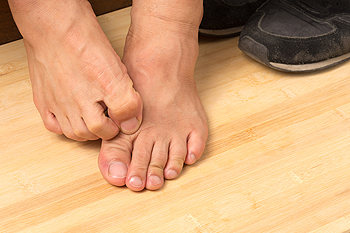Blog Archives
What Can Cause Cracked Heels?
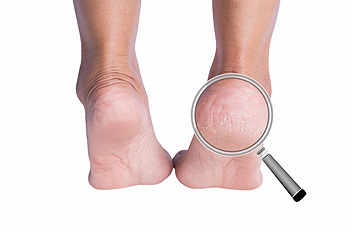 A foot condition that can cause pain, discomfort, and an unsightly appearance can be described as cracked heels. It can occur as a result of wearing shoes that have an open back, or possibly from specific medical conditions. These can include thyroid disorders, diabetes, or kidney concerns. Additionally, people who are overweight may experience cracked heels from the excess weight and pressure the heels endure. Mild relief may be found when the feet are soaked in warm water, followed by applying a good moisturizer on them. Research has indicated it may help to add a vitamin regime into your daily routine, in addition to drinking plenty of fresh water. If you have cracked heels, it is suggested that you confer with a podiatrist who can offer effective treatment options.
A foot condition that can cause pain, discomfort, and an unsightly appearance can be described as cracked heels. It can occur as a result of wearing shoes that have an open back, or possibly from specific medical conditions. These can include thyroid disorders, diabetes, or kidney concerns. Additionally, people who are overweight may experience cracked heels from the excess weight and pressure the heels endure. Mild relief may be found when the feet are soaked in warm water, followed by applying a good moisturizer on them. Research has indicated it may help to add a vitamin regime into your daily routine, in addition to drinking plenty of fresh water. If you have cracked heels, it is suggested that you confer with a podiatrist who can offer effective treatment options.
If the skin on your feet starts to crack, you may want to see a podiatrist to find treatment. If you have any concerns, contact Dr. Sharon Pletcher from Pennsylvania. Our doctor can provide the care you need to keep you pain-free and on your feet.
Cracked Heels
It is important to moisturize your cracked heels in order to prevent pain, bleeding, and infection. The reason cracked heels form is because the skin on the foot is too dry to support the immense pressure placed on them. When the foot expands, the dry skin on the foot begins to split.
Ways to Help Heal Them
- Invest in a good foot cream
- Try Using Petroleum Jelly
- Ease up on Soaps
- Drink Plenty of Water
Ways to Prevent Cracked Heels
- Moisturize After Showering
- Skip a Shower
- Keep Shower Water Lukewarm
- Don’t Scrub Your Feet
If you are unsure how to proceed in treating cracked heels, seek guidance from a podiatrist. Your doctor will help you with any questions or information you may need.
If you have any questions, please feel free to contact our office located in State College, PA. We offer the newest diagnostic and treatment technologies for all your foot care needs.
Read more about Solutions for Cracked HeelsSwollen Feet, Causes, and Remedies During Pregnancy
 A common symptom of pregnancy is swollen feet. This can happen for a variety of reasons, including an increase in blood circulation, the weight of the unborn baby, or from sitting for extended periods of time. Additionally, eating foods that contain large amounts of sodium may contribute to swollen feet and ankles. It is beneficial to perform gentle stretches daily, and mild relief may be found when exercise is performed on a regular basis. Drinking approximately eight glasses of water during the day may also help to alleviate swollen feet. If you would like more information about your foot concerns during pregnancy, it is suggested that you confer with a podiatrist.
A common symptom of pregnancy is swollen feet. This can happen for a variety of reasons, including an increase in blood circulation, the weight of the unborn baby, or from sitting for extended periods of time. Additionally, eating foods that contain large amounts of sodium may contribute to swollen feet and ankles. It is beneficial to perform gentle stretches daily, and mild relief may be found when exercise is performed on a regular basis. Drinking approximately eight glasses of water during the day may also help to alleviate swollen feet. If you would like more information about your foot concerns during pregnancy, it is suggested that you confer with a podiatrist.
Pregnant women with swollen feet can be treated with a variety of different methods that are readily available. For more information about other cures for swollen feet during pregnancy, consult with Dr. Sharon Pletcher from Pennsylvania. Our doctor will attend to all of your foot and ankle needs.
What Foot Problems Can Arise During Pregnancy?
One problem that can occur is overpronation, which occurs when the arch of the foot flattens and tends to roll inward. This can cause pain and discomfort in your heels while you’re walking or even just standing up, trying to support your baby.
Another problem is edema, or swelling in the extremities. This often affects the feet during pregnancy but tends to occur in the later stages.
How Can I Keep My Feet Healthy During Pregnancy?
- Wearing orthotics can provide extra support for the feet and help distribute weight evenly
- Minimize the amount of time spent walking barefoot
- Wear shoes with good arch support
- Wear shoes that allow for good circulation to the feet
- Elevate feet if you experience swelling
- Massage your feet
- Get regular, light exercise, such as walking, to promote blood circulation to the feet
If you have any questions please feel free to contact our office located in State College, PA. We offer the newest diagnostic and treatment technologies for all your foot and ankle needs.
Read more about Foot Care for Pregnant WomenCauses and Treatments for an Ingrown Toenail
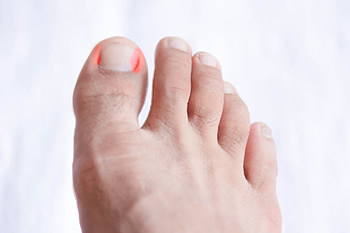 An ingrown toenail occurs when a curved toenail grows into the skin on the sides of the nail. The toenail digs into the skin and causes pain, redness, and swelling as the skin grows around the nail. If left untreated, it can cause a bacterial infection. Ingrown toenails are often caused by trauma, tightly fitting shoes, or cutting the toenails at an angle instead of straight across. Those who notice an ingrown toenail should treat it immediately by soaking it in warm water, drying it with a towel, and bandaging it. If there is significant swelling, pain, inflammation or discharge, the toenail is likely infected. Ingrown toenails that won’t heal, occur frequently, or are infected should be looked at by a podiatrist.
An ingrown toenail occurs when a curved toenail grows into the skin on the sides of the nail. The toenail digs into the skin and causes pain, redness, and swelling as the skin grows around the nail. If left untreated, it can cause a bacterial infection. Ingrown toenails are often caused by trauma, tightly fitting shoes, or cutting the toenails at an angle instead of straight across. Those who notice an ingrown toenail should treat it immediately by soaking it in warm water, drying it with a towel, and bandaging it. If there is significant swelling, pain, inflammation or discharge, the toenail is likely infected. Ingrown toenails that won’t heal, occur frequently, or are infected should be looked at by a podiatrist.
Ingrown toenails can become painful if they are not treated properly. For more information about ingrown toenails, contact Dr. Sharon Pletcher of Pennsylvania. Our doctor can provide the care you need to keep you pain-free and on your feet.
Ingrown Toenails
Ingrown toenails occur when a toenail grows sideways into the bed of the nail, causing pain, swelling, and possibly infection.
Causes
- Bacterial infections
- Improper nail cutting such as cutting it too short or not straight across
- Trauma to the toe, such as stubbing, which causes the nail to grow back irregularly
- Ill-fitting shoes that bunch the toes too close together
- Genetic predisposition
Prevention
Because ingrown toenails are not something found outside of shoe-wearing cultures, going barefoot as often as possible will decrease the likeliness of developing ingrown toenails. Wearing proper fitting shoes and using proper cutting techniques will also help decrease your risk of developing ingrown toenails.
Treatment
Ingrown toenails are a very treatable foot condition. In minor cases, soaking the affected area in salt or antibacterial soaps will not only help with the ingrown nail itself, but also help prevent any infections from occurring. In more severe cases, surgery is an option. In either case, speaking to your podiatrist about this condition will help you get a better understanding of specific treatment options that are right for you.
If you have any questions please feel free to contact our office located in State College, PA. We offer the newest diagnostic and treatment technologies for all your foot and ankle needs.
Read more about Ingrown ToenailsTips for Happy Feet
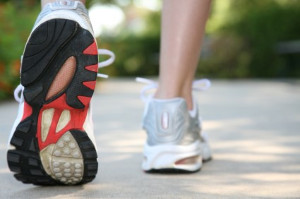 Your feet support your weight and help you move throughout the day. Taking care of your feet can play a big role in maintaining your overall health. One of the most important aspects of good foot care is making sure that the shoes you wear are comfortable, supportive, and properly fitted. The right shoes can prevent a variety of painful injuries and foot conditions. Look for shoes that protect, cushion, and support your feet, and avoid shoes like flip flops, which are often flimsy and can increase your risk of foot pain. Proper hygiene is an important part of foot health as well. Wash and thoroughly dry your feet daily to avoid fungal infections, and trim your toenails straight across and not too short to help prevent ingrown nails. For more tips on everyday foot care, it is suggested that you consult with a podiatrist.
Your feet support your weight and help you move throughout the day. Taking care of your feet can play a big role in maintaining your overall health. One of the most important aspects of good foot care is making sure that the shoes you wear are comfortable, supportive, and properly fitted. The right shoes can prevent a variety of painful injuries and foot conditions. Look for shoes that protect, cushion, and support your feet, and avoid shoes like flip flops, which are often flimsy and can increase your risk of foot pain. Proper hygiene is an important part of foot health as well. Wash and thoroughly dry your feet daily to avoid fungal infections, and trim your toenails straight across and not too short to help prevent ingrown nails. For more tips on everyday foot care, it is suggested that you consult with a podiatrist.
Everyday foot care is very important to prevent infection and other foot ailments. If you need your feet checked, contact Dr. Sharon Pletcher from Pennsylvania. Our doctor can provide the care you need to keep you pain-free and on your feet.
Everyday Foot Care
Often, people take care of their bodies, face and hair more so than they do for their feet. But the feet are a very important aspect of our bodies, and one that we should pay more attention to. Without our feet, we would not be able to perform most daily tasks.
It is best to check your feet regularly to make sure there are no new bruises or cuts that you may not have noticed before. For dry feet, moisturizer can easily be a remedy and can be applied as often as necessary to the affected areas. Wearing shoes that fit well can also help you maintain good foot health, as well as making it easier to walk and do daily activities without the stress or pain of ill-fitting shoes, high heels, or even flip flops. Wearing clean socks with closed shoes is important to ensure that sweat and bacteria do not accumulate within the shoe. Clean socks help to prevent Athlete’s foot, fungi problems, bad odors, and can absorb sweat.
If you have any questions please feel free to contact our office located in State College, PA. We offer the newest diagnostic and treatment technologies for all your foot and ankle needs.
Read more about Every Day Foot CareWhat Can Cause Diabetes?
 There are many reasons people can develop diabetes. These can consist of genetics, environmental factors, and eating habits. The feet are often affected in diabetic patients, and it may be difficult to feel sensations. This can result in the development of foot ulcers, and in severe cases, the toes and entire foot can be lost to amputation. It is beneficial to check your feet on a daily basis for any cuts, scrapes, or sores. It is important to wear shoes that fit correctly, and this can be implemented by trying shoes on at the end of the day when the feet are generally at their largest. There are several methods diabetic patients can use to protect their feet, and it is suggested that a podiatrist be consulted for additional information.
There are many reasons people can develop diabetes. These can consist of genetics, environmental factors, and eating habits. The feet are often affected in diabetic patients, and it may be difficult to feel sensations. This can result in the development of foot ulcers, and in severe cases, the toes and entire foot can be lost to amputation. It is beneficial to check your feet on a daily basis for any cuts, scrapes, or sores. It is important to wear shoes that fit correctly, and this can be implemented by trying shoes on at the end of the day when the feet are generally at their largest. There are several methods diabetic patients can use to protect their feet, and it is suggested that a podiatrist be consulted for additional information.
Diabetic foot care is important in preventing foot ailments such as ulcers. If you are suffering from diabetes or have any other concerns about your feet, contact Dr. Sharon Pletcher from Pennsylvania. Our doctor can provide the care you need to keep you pain-free and on your feet.
Diabetic Foot Care
Diabetes affects millions of people every year. The condition can damage blood vessels in many parts of the body, especially the feet. Because of this, taking care of your feet is essential if you have diabetes, and having a podiatrist help monitor your foot health is highly recommended.
The Importance of Caring for Your Feet
- Routinely inspect your feet for bruises or sores.
- Wear socks that fit your feet comfortably.
- Wear comfortable shoes that provide adequate support.
Patients with diabetes should have their doctor monitor their blood levels, as blood sugar levels play such a huge role in diabetic care. Monitoring these levels on a regular basis is highly advised.
It is always best to inform your healthcare professional of any concerns you may have regarding your feet, especially for diabetic patients. Early treatment and routine foot examinations are keys to maintaining proper health, especially because severe complications can arise if proper treatment is not applied.
If you have any questions please feel free to contact our office located in State College, PA. We offer the newest diagnostic and treatment technologies for all your foot and ankle needs.
Read more about Diabetic Foot CareWhat Are Common Symptoms Of Athlete’s Foot?
A fungal infection of the skin on the feet is known as athlete's foot. It is often uncomfortable and may appear unsightly. Blisters can develop between the toes and the skin is generally red and itchy. Peeling skin may occur on the sole of the affected foot, and the toenails can become discolored. The fungus that causes this type of infection lives in warm and moist environments. These can consist of public swimming pools and shower room floors. It is beneficial to wear appropriate shoes while frequenting these areas as this may help to prevent the spreading of athlete's foot. Treatment methods can include applying topical antifungal medication, and this may help to provide mild relief. If you are afflicted with this ailment, please speak with a podiatrist who can determine what the best treatment is for you.
Athlete’s Foot
Athlete’s foot is often an uncomfortable condition to experience. Thankfully, podiatrists specialize in treating athlete’s foot and offer the best treatment options. If you have any questions about athlete’s foot, consult with Dr. Sharon Pletcher from Pennsylvania. Our doctor will assess your condition and provide you with quality treatment.
What Is Athlete’s Foot?
Tinea pedis, more commonly known as athlete’s foot, is a non-serious and common fungal infection of the foot. Athlete’s foot is contagious and can be contracted by touching someone who has it or infected surfaces. The most common places contaminated by it are public showers, locker rooms, and swimming pools. Once contracted, it grows on feet that are left inside moist, dark, and warm shoes and socks.
Prevention
The most effective ways to prevent athlete’s foot include:
- Thoroughly washing and drying feet
- Avoid going barefoot in locker rooms and public showers
- Using shower shoes in public showers
- Wearing socks that allow the feet to breathe
- Changing socks and shoes frequently if you sweat a lot
Symptoms
Athlete’s foot initially occurs as a rash between the toes. However, if left undiagnosed, it can spread to the sides and bottom of the feet, toenails, and if touched by hand, the hands themselves. Symptoms include:
- Redness
- Burning
- Itching
- Scaly and peeling skin
Diagnosis and Treatment
Diagnosis is quick and easy. Skin samples will be taken and either viewed under a microscope or sent to a lab for testing. Sometimes, a podiatrist can diagnose it based on simply looking at it. Once confirmed, treatment options include oral and topical antifungal medications.
If you have any questions, please feel free to contact our office located in State College, PA. We offer the newest diagnostic and treatment technologies for all your foot care needs.
Read more about How to Deal with Athlete's Foot
Why Does My Foot Hurt?
Foot pain, on its own, is a fairly nonspecific symptom. There are many conditions that may lead to foot pain. Plantar fasciitis, in which the ligament that runs along the bottom of the foot becomes inflamed, is a frequent cause of foot pain. Morton’s neuroma, a condition in which a nerve in the foot starts to thicken and place pressure on the toes, is also a fairly common problem. Other foot problems that can cause pain include metatarsalgia, tendinitis, turf toe, hallux valgus, heel pad atrophy, arthritis, and heel spurs. To figure out what is causing your foot pain, and how to treat it, it is suggested that you seek the care of a podiatrist.
Foot Pain
Foot pain can be extremely painful and debilitating. If you have a foot pain, consult with Dr. Sharon Pletcher from Pennsylvania. Our doctor will assess your condition and provide you with quality foot and ankle treatment.
Causes
Foot pain is a very broad condition that could be caused by one or more ailments. The most common include:
- Bunions
- Hammertoes
- Plantar Fasciitis
- Bone Spurs
- Corns
- Tarsal Tunnel Syndrome
- Ingrown Toenails
- Arthritis (such as Gout, Rheumatoid, and Osteoarthritis)
- Flat Feet
- Injury (from stress fractures, broken toe, foot, ankle, Achilles tendon ruptures, and sprains)
- And more
Diagnosis
To figure out the cause of foot pain, podiatrists utilize several different methods. This can range from simple visual inspections and sensation tests to X-rays and MRI scans. Prior medical history, family medical history, and any recent physical traumatic events will all be taken into consideration for a proper diagnosis.
Treatment
Treatment depends upon the cause of the foot pain. Whether it is resting, staying off the foot, or having surgery; podiatrists have a number of treatment options available for foot pain.
If you have any questions, please feel free to contact our office located in State College, PA. We offer the newest diagnostic and treatment technologies for all your foot care needs.
Read more about Foot PainAre There Relief Options for Arthritic Foot Pain?
 Arthritis is a common ailment in patients who are over 65 years of age. It is a condition that can affect the feet and cause severe pain and discomfort. There are simple stretches and exercises which can help to ease some of the pain. Flexibility may be improved, and there can be an increase in synovial joint fluids as a result of frequently performing stretches. Additionally, an exercise routine can be beneficial in increasing existing range of motion. There may be more aggressive measures that can be implemented which may help to reduce arthritis foot pain. These can include changing specific eating habits, medication, or possibly joint replacement surgery. If you have arthritis in your foot, it is suggested that you speak with a podiatrist who can determine what the best course of treatment is for you.
Arthritis is a common ailment in patients who are over 65 years of age. It is a condition that can affect the feet and cause severe pain and discomfort. There are simple stretches and exercises which can help to ease some of the pain. Flexibility may be improved, and there can be an increase in synovial joint fluids as a result of frequently performing stretches. Additionally, an exercise routine can be beneficial in increasing existing range of motion. There may be more aggressive measures that can be implemented which may help to reduce arthritis foot pain. These can include changing specific eating habits, medication, or possibly joint replacement surgery. If you have arthritis in your foot, it is suggested that you speak with a podiatrist who can determine what the best course of treatment is for you.
Arthritis can be a difficult condition to live with. If you are seeking treatment, contact Dr. Sharon Pletcher from Pennsylvania. Our doctor can provide the care you need to keep you pain-free and on your feet.
Arthritic Foot Care
Arthritis is a joint disorder that involves the inflammation of different joints in your body, such as those in your feet. Arthritis is often caused by a degenerative joint disease and causes mild to severe pain in all affected areas. In addition to this, swelling and stiffness in the affected joints can also be a common symptom of arthritis.
In many cases, wearing ill-fitting shoes can worsen the effects and pain of arthritis. Wearing shoes that have a lower heel and extra room can help your feet feel more comfortable. In cases of rheumatoid arthritis, the arch in your foot may become problematic. Buying shoes with proper arch support that contour to your feet can help immensely.
Alleviating Arthritic Pain
- Exercises that stretch the foot can prevent further pain and injury and increase mobility
- Most of the pain can be alleviated with anti-inflammatory drugs, heat, and topical medications
- Massages can help temporarily alleviate pain.
It is best to see your doctor for the treatment that is right for your needs and symptoms. Conditions vary, and a podiatrist can help you determine the right method of care for your feet.
If you have any questions, please feel free to contact our office located in State College, PA. We offer the newest diagnostic tools and technology to treat your foot and ankle needs.
Read more about How to Care for Your Arthritic FootMore...
What Are the Causes of Ingrown Toenails?
 The medical condition that is referred to as an ingrown toenail can be accompanied by redness, swelling, and pain. It is an ailment that often affects the big toe, and occurs when the nail grows into the outer edge of the skin. Common reasons why this condition can occur include wearing shoes that do not have adequate room for the toes to move freely in or from a toe injury. Additionally, repeated activities that involve kicking a ball may cause ingrown toenails to develop. Relief may be found when the affected toe is soaked in warm water, followed by placing a small piece of cotton between the nail and the skin. If your ingrown toenail has become infected, it is strongly recommended that you seek the counsel of a podiatrist who can properly treat this condition.
The medical condition that is referred to as an ingrown toenail can be accompanied by redness, swelling, and pain. It is an ailment that often affects the big toe, and occurs when the nail grows into the outer edge of the skin. Common reasons why this condition can occur include wearing shoes that do not have adequate room for the toes to move freely in or from a toe injury. Additionally, repeated activities that involve kicking a ball may cause ingrown toenails to develop. Relief may be found when the affected toe is soaked in warm water, followed by placing a small piece of cotton between the nail and the skin. If your ingrown toenail has become infected, it is strongly recommended that you seek the counsel of a podiatrist who can properly treat this condition.
Ingrown toenails may initially present themselves as a minor discomfort, but they may progress into an infection in the skin without proper treatment. For more information about ingrown toenails, contact Dr. Sharon Pletcher of Pennsylvania. Our doctor can provide the care you need to keep you pain-free and on your feet.
Ingrown Toenails
Ingrown toenails are caused when the corner or side of a toenail grows into the soft flesh surrounding it. They often result in redness, swelling, pain, and in some cases, infection. This condition typically affects the big toe and may recur if it is not treated properly.
Causes
- Improper toenail trimming
- Genetics
- Improper shoe fitting
- Injury from pedicures or nail picking
- Abnormal gait
- Poor hygiene
You are more likely to develop an ingrown toenail if you are obese, have diabetes, arthritis, or have any fungal infection in your nails. Additionally, people who have foot or toe deformities are at a higher risk of developing an ingrown toenail.
Symptoms
Some symptoms of ingrown toenails are redness, swelling, and pain. In rare cases, there may be a yellowish drainage coming from the nail.
Treatment
Ignoring an ingrown toenail can have serious complications. Infections of the nail border can progress to a deeper soft-tissue infection, which can then turn into a bone infection. You should always speak with your podiatrist if you suspect you have an ingrown toenail, especially if you have diabetes or poor circulation.
If you have any questions, please feel free to contact our office located in State College, PA. We offer the newest diagnostic and treatment technologies for all your foot care needs.
Read more about Ingrown Toenail CareComplications of Excessive Sweating in the Feet
Everybody sweats from their feet, but sometimes, the amount of sweat can be too much. Excessive foot sweat is an indicator of plantar hyperhidrosis, which is a medical condition where the sweat glands produce too much sweat in conditions that would not normally cause much sweating. If you have plantar hyperhidrosis, seeking treatment is recommended. This is because sweating excessively from your feet can lead to various complications. These can include an increase in the risk of developing cuts and breaks in the skin, which can lead to foot infections, such as athlete’s foot. Infections can be especially dangerous if you have other health problems that affect the feet, like diabetes, peripheral neuropathy, or peripheral artery disease. Excessive foot sweat can also be embarrassing, leading to psychological distress and avoidance of certain social situations. To learn more about plantar hyperhidrosis and the treatments available for this condition, please speak with a podiatrist.
If you are suffering from hyperhidrosis contact Dr. Sharon Pletcher of Pennsylvania. Our doctor can provide the care you need to attend to all of your foot and ankle needs.
Hyperhidrosis of the Feet
Hyperhidrosis is a rare disorder that can cause people to have excessive sweating of their feet. This can usually occur all on its own without rigorous activity involved. People who suffer from hyperhidrosis may also experience sweaty palms.
Although it is said that sweating is a healthy process meant to cool down the body temperature and to maintain a proper internal temperature, hyperhidrosis may prove to be a huge hindrance on a person’s everyday life.
Plantar hyperhidrosis is considered to be the main form of hyperhidrosis. Secondary hyperhidrosis can refer to sweating that occurs in areas other than the feet or hands and armpits. Often this may be a sign of it being related to another medical condition such as menopause, hyperthyroidism and even Parkinson’s disease.
In order to alleviate this condition, it is important to see your doctor so that they may prescribe the necessary medications so that you can begin to live a normal life again. If this is left untreated, it is said that it will persist throughout an individual’s life.
A last resort approach would be surgery, but it is best to speak with your doctor to find out what may be the best treatment for you.
If you have any questions please feel free to contact our office located in State College, PA. We offer the newest diagnostic and treatment technologies for all your foot and ankle needs.
Read more about Hyperhidrosis of the FeetStrength Training May Help Prevent Running Injuries
 The importance of taking the necessary steps to prevent running injuries may not be known by everyone, however, it is often recognized among people who enjoy running as a sport or hobby. Firstly, it is beneficial to practice strength training for the whole body and this may aide in the prevention of painful injuries. Performing single-leg exercises can help to improve balance and stability, in addition to practicing squats and deadlifts. Secondly, the recovery process is just as important as running and performing strength exercises. Proper recovery can help prevent damage to the bones and muscles. If you are experiencing a sharp or stabbing pain you shouldn’t run that day. If you feel slightly sore you can still run, but it is suggested to shorten the distance originally planned. To add variety to the repetitive nature of running, rotate two or more pairs of running shoes to subtly alter your biomechanics. If you would like more information about running injuries and how to prevent them, please speak with a podiatrist.
The importance of taking the necessary steps to prevent running injuries may not be known by everyone, however, it is often recognized among people who enjoy running as a sport or hobby. Firstly, it is beneficial to practice strength training for the whole body and this may aide in the prevention of painful injuries. Performing single-leg exercises can help to improve balance and stability, in addition to practicing squats and deadlifts. Secondly, the recovery process is just as important as running and performing strength exercises. Proper recovery can help prevent damage to the bones and muscles. If you are experiencing a sharp or stabbing pain you shouldn’t run that day. If you feel slightly sore you can still run, but it is suggested to shorten the distance originally planned. To add variety to the repetitive nature of running, rotate two or more pairs of running shoes to subtly alter your biomechanics. If you would like more information about running injuries and how to prevent them, please speak with a podiatrist.
Exercising your feet regularly with the proper foot wear is a great way to prevent injuries. If you have any concerns about your feet, contact Dr. Sharon Pletcher of Pennsylvania. Our doctor will treat your foot and ankle needs.
How to Prevent Running Injuries
Many common running injuries are caused by overuse and overtraining. When the back of the kneecap starts wearing out and starts causing pain in your knee, this is commonly referred to as runner’s knee. Runner’s knee is a decrease in strength in your quadriceps and can occur if you’re not wearing properly fitted or supporting shoes. To prevent runner’s knee, focusing on hip strengthening is a good idea, as well as strengthening your quads to keep the kneecaps aligned.
What Are Some Causes of Running Injuries?
- One cause of a common running injury is called iliotibial band syndrome.
- Plantar fasciitis is also another common injury.
- Stress fractures can occur from overtraining, lack of calcium, or even your running style.
Best Ways to Prevent Running Injuries
- Wear footwear that fits properly and suits your running needs.
- Running shoes are the only protective gear that runners have to safeguard them from injury.
- Make a training schedule. Adding strengthening exercises as well as regular stretching can help keep you strong and limber and can lessen the possibility of injuries.
- Stretching keeps muscles limber; this will help you gain better flexibility.
If you have any questions please feel free to contact our office located in State College, PA. We offer the newest diagnostic and treatment technologies for all your foot and ankle needs.
Read more about How to Prevent Running InjuriesDid I Fracture My Foot?
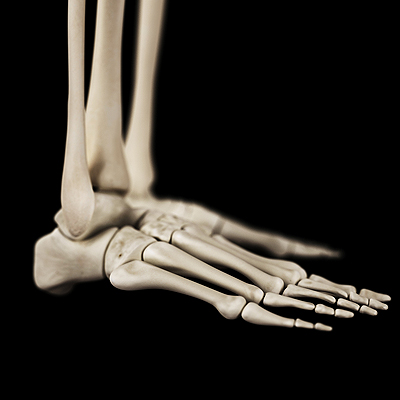 A broken foot can occur as a simple crack or as a complete break in the bone. Signs of a fractured foot can include tenderness, increased pain when standing or walking, numbness, swelling, bruising, trouble with movement, and an abnormal foot shape. If you believe that you have fractured your foot, you will likely need to visit a podiatrist for a proper diagnosis. In order to properly diagnose a foot fracture, an X-ray, CT scan, MRI or a bone scan will be necessary. Once a foot fracture is diagnosed, a cast, splint, or boot may be needed to limit the foot’s movement. A podiatrist will likely prescribe medicine, and in some cases surgery may be necessary as well.
A broken foot can occur as a simple crack or as a complete break in the bone. Signs of a fractured foot can include tenderness, increased pain when standing or walking, numbness, swelling, bruising, trouble with movement, and an abnormal foot shape. If you believe that you have fractured your foot, you will likely need to visit a podiatrist for a proper diagnosis. In order to properly diagnose a foot fracture, an X-ray, CT scan, MRI or a bone scan will be necessary. Once a foot fracture is diagnosed, a cast, splint, or boot may be needed to limit the foot’s movement. A podiatrist will likely prescribe medicine, and in some cases surgery may be necessary as well.
A broken foot requires immediate medical attention and treatment. If you need your feet checked, contact Dr. Sharon Pletcher from Pennsylvania. Our doctor can provide the care you need to keep you pain-free and on your feet.
Broken Foot Causes, Symptoms, and Treatment
A broken foot is caused by one of the bones in the foot typically breaking when bended, crushed, or stretched beyond its natural capabilities. Usually the location of the fracture indicates how the break occurred, whether it was through an object, fall, or any other type of injury.
Common Symptoms of Broken Feet:
- Bruising
- Pain
- Redness
- Swelling
- Blue in color
- Numbness
- Cold
- Misshapen
- Cuts
- Deformities
Those that suspect they have a broken foot shoot seek urgent medical attention where a medical professional could diagnose the severity.
Treatment for broken bones varies depending on the cause, severity and location. Some will require the use of splints, casts or crutches while others could even involve surgery to repair the broken bones. Personal care includes the use of ice and keeping the foot stabilized and elevated.
If you have any questions please feel free to contact our office located in State College, PA. We offer the newest diagnostic and treatment technologies for all your foot and ankle needs.
Read more about Causes, Symptoms, and Treatment for a Broken Foot





